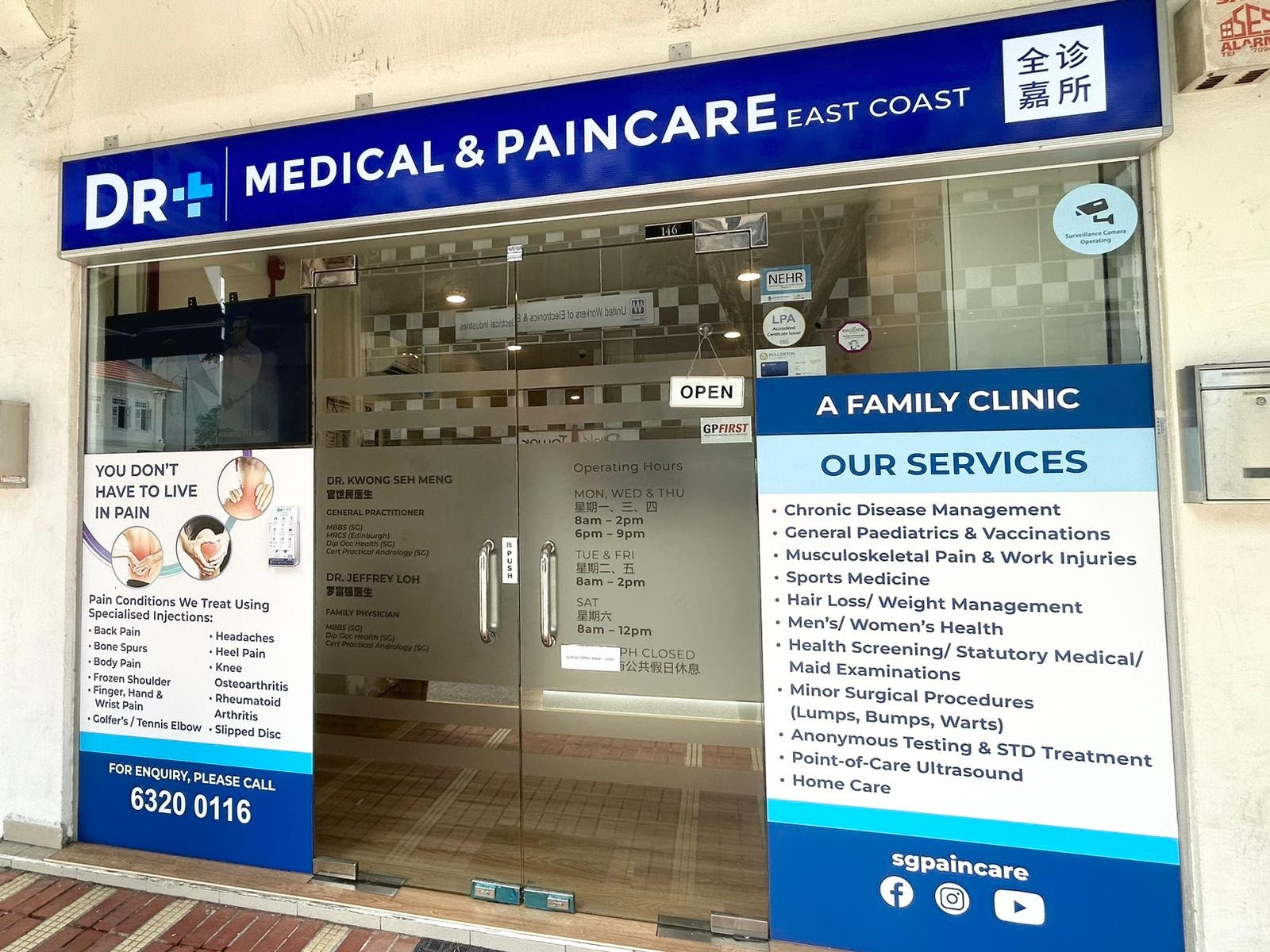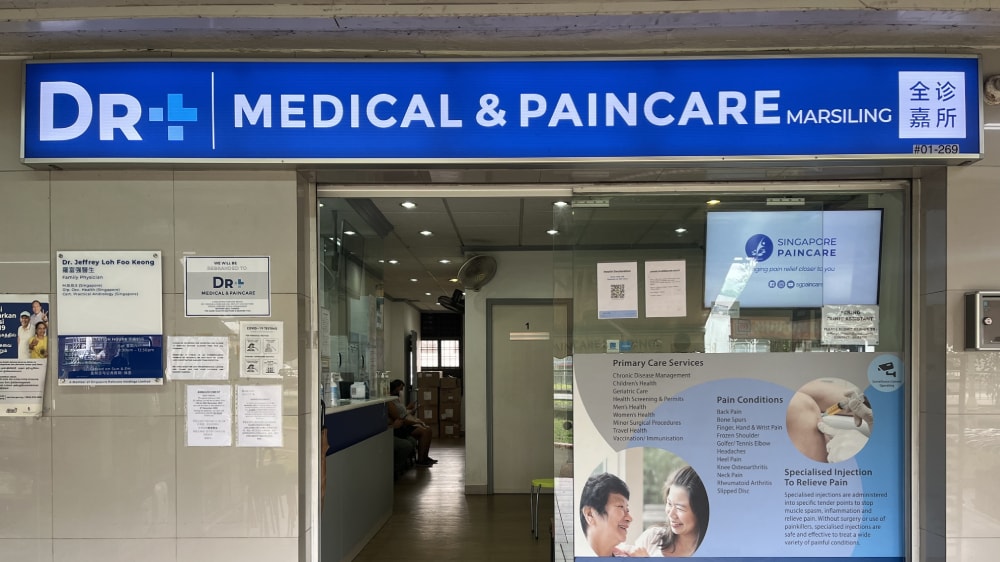Neck Pain

What is Neck Pain
The neck comprises various structures, including cervical ligaments, which offer spinal stability, and muscles that provide support and facilitate movement. With its significant range of motion and the weight-bearing responsibility of the head, the neck is susceptible to injury and conditions that cause pain and limit mobility.
Neck pain may result from injury, mechanical or muscular issues, nerve compression due to disc bulges, or arthritis. Its severity can range from mild discomfort to intense, debilitating pain. Neck pain is prevalent, especially among women, and seeking treatment for it in Singapore is a common occurrence for most individuals during their lifetime.
Signs and Symptoms
Neck pain presents a spectrum of symptoms, each indicative of the underlying cause and severity of the condition.
- Localised Pain: The most common symptom, often described as a persistent ache or discomfort in one area of the neck. It can vary in intensity and may be exacerbated by certain movements or positions.
- Radiating Pain: Pain that extends beyond the neck to the shoulders, arms, or even fingers. This can suggest nerve compression or irritation, such as in cases of cervical radiculopathy.
- Noisy Joints: You might notice clicking or grating (referred to as ‘crepitus’) when moving your head, likely due to roughened bony surfaces or ligaments rubbing against bone surfaces. This sensation is typically most pronounced at the top of the neck.
- Dizziness and blackouts: These symptoms may occur if cervical spondylosis leads to bony changes that compress the vertebral artery. You might experience dizziness when looking up or have occasional blackouts.
- Other Symptoms: If you experience persistent neck pain and stiffness, especially if it disrupts your sleep, you may feel unusually tired, which can potentially lead to depression.
Causes and Risk Factors
Neck pain can stem from soft tissues like muscles and ligaments, or from the cervical spine, which includes nerves, discs, facet joints, and bones. The primary causes are often soft tissue abnormalities due to injury or prolonged wear-and-tear, although infection or tumors can occasionally trigger neck pain. Some individuals may experience pain in the upper back, shoulders, or arms due to neck problems.
Various factors can trigger neck pain, including direct injury, stress, repetitive strain from awkward neck positions, and ergonomic strain. Despite numerous theories, the exact reasons behind widespread neck pain lack scientific proof, leading to the proliferation of neck pillows, supports, collars, and other aids. For some, the cause of their neck pain remains unidentified.
Road traffic accidents, particularly those involving whiplash injury, can lead to acute or chronic neck pain that may take months to improve. Additionally, individuals who experience excessive stress and strain on their “anti-gravity muscles” may suffer from neck pain and tension headaches.
Common Causes of Neck Pain
- Slipped Disc / Prolapsed Disc
- Nerve Impingement/Compression
- Facet Joint Syndrome
- Muscle and Ligamental Pain Syndrome
- Fibromyalgia
Non-Specific Neck Pain
Many people develop a stiff and painful neck without an apparent cause. It may arise after exposure to a draught (like cold wind or air conditioning) or following a minor twisting injury, such as during gardening. This type of neck pain is referred to as “non-specific neck pain” due to its unclear underlying cause. Non-specific neck pain doesn’t necessarily signify structural damage to the neck and often occurs in individuals with normal necks on X-rays. It’s the most common type of neck pain and usually resolves within a few days.
- Whiplash: Whiplash injuries frequently occur after rear-end car collisions. During such collisions, the body moves forward while the head snaps backward and then forward as the body stops abruptly. Symptoms of pain and stiffness often emerge after a delay following the injury, with soft tissues like muscles and ligaments being the most commonly affected. Severe injuries, involving neck fractures or dislocations, can potentially harm the spinal cord, leading to paralysis (quadriplegia).
While whiplash injuries can be severe, most individuals involved in such collisions do not sustain major damage. In many cases, symptoms improve within weeks or months. The use of seat belts and properly adjusted headrests in cars has significantly reduced the severity of whiplash injuries.
- Tension: Many muscles in the body relax when not in use, but specific muscles, known as “anti-gravity muscles,” must consistently work to uphold upright posture. For instance, the muscles at the back of the neck remain tensed to prevent the head from falling forward while sitting or standing. Overexertion of these muscles can result in neck pain and tension headaches. Stress or anxiety often prompts individuals to tense their muscles excessively, worsening the issue. Tension headaches, commonly misidentified as migraines, frequently arise from this muscle tension.
- Rine Neck: Patients often awaken in the morning with a stiff neck that gradually progresses to pain when turning the head. Typically, neck pain may improve within a week, but it can be distressing and uncomfortable. The stiff neck is often attributed to tense neck muscles during sleep, particularly in cases of disrupted sleep. Additionally, factors such as poor blood circulation and a cold environment can lead to muscle spasms and trigger points.
Diagnosis
Our GP Doctor will gather a comprehensive history of your neck-related issues. This may involve inquiring about any concurrent medical conditions, past neck injuries, and associated complaints with neck pain. They will also review your previous treatments for neck conditions. Following this, a physical examination may encompass assessing neck movement, tenderness, and the functionality of nerves and muscles in your arms and legs.
Patients in need of additional assessment may undergo one or more of the following examinations:
- Magnetic Resonance Imaging (MRI): This imaging study enables assessment of the spinal cord and nerve roots.
- Computed Tomography (CT): This specialized X-ray study allows detailed evaluation of the bones and spinal canal.
- Myelogram: This procedure involves injecting a dye or contrast material into the spinal canal for a precise X-ray evaluation of the spinal canal and nerve roots.
- Electromyogram (EMG): This test assesses nerve and muscle function through nerve conduction and electromyography.
Treatment Modalities
Pain Medication
This involves the use of medications such as Non-Steroidal Anti-Inflammatory Drugs (NSAIDs), opioids, and other specialised medications designed for pain management. The type and dosage are tailored to the individual’s condition and medical history.
Myospan
Minimally invasive treatments aim to effectively relieve common pain conditions by targeting pain sources.
- Coreflex Injections: Typically contain a corticosteroid and are used for inflamed joints or tissues.
- Platelet-Rich Plasma (PRP) injections: Utilise own platelets to promote healing in damaged tissues.
- Intra-Articular Injections: Most commonly used to treat osteoarthritis in the hip or knee, but they can also be given in other joints, including shoulders, wrists, ankles, hands, and fingers.
For chronic pain conditions originating from spinal issues, Neurospan can be performed by our team of pain specialists from Singapore Paincare Center.
Struggling With Persistent Pain?
Consult one of our doctors today for a detailed consultation & personalised treatment plan.
Prevention Strategies
Preventing neck pain involves adopting practices that protect and strengthen the neck.
- Ergonomics at Work: Adjust the workspace to promote good posture. This includes setting the computer monitor at eye level, using chairs with adequate support, and taking frequent breaks to stretch.
- Posture Correction: Maintain good posture not only while sitting but also when standing and walking. Avoid slouching and keep the shoulders in line with the hips.
- Regular Exercise: Engaging in regular physical activity strengthens the muscles in the neck and upper back, providing better support to the cervical spine.
- Neck Strengthening Exercises: Specific exercises can target the muscles around the neck and upper back, enhancing their resilience and flexibility.
- Weight Management: Maintaining a healthy weight reduces stress on the neck and spine, lessening the likelihood of developing neck pain.
- Avoiding Repetitive Strain: Be mindful of activities that involve repetitive movements or prolonged positions that strain the neck, such as certain sports or occupations.
- Proper Lifting Techniques: When lifting objects, use the legs rather than the neck and back to prevent strain.
- Adequate Sleep: Ensuring sufficient and quality sleep helps in muscle relaxation and recovery. The use of a supportive pillow and a mattress that maintains spinal alignment is recommended.
- Stress Management: Chronic stress can lead to muscle tension in the neck. Techniques such as mindfulness, deep breathing exercises, and yoga can be effective in managing stress.
- Quit Smoking: Smoking can contribute to degenerative disc diseases and hence increases the risk of neck pain.
- Safe Driving Practices: Adjusting the headrest and seat position in the car to support the neck can reduce the risk of neck injuries, especially in accidents.
- Hydration: Adequate hydration can maintain the elasticity and fluidity of the soft tissues and joints in the neck.
Frequently Asked Questions (FAQ)
What are the most common causes of neck pain?
Neck pain commonly arises from strained muscles, worn joints, nerve compression, and injuries. Conditions such as osteoarthritis, spinal stenosis, and herniated discs also contribute to neck pain.
How can I differentiate between normal neck pain and a serious condition?
Normal neck pain often results from posture or minor strains and typically resolves with self-care. Serious conditions may present with persistent, severe pain, numbness, loss of strength, or coordination problems.
How effective are home remedies in managing neck pain?
Home remedies like rest, heat or cold application, and gentle stretching can be effective for mild neck pain but may not suffice for more severe conditions.
When should you seek medical care?
Seek medical care if the pain is severe, persists for several weeks without relief, spreads down arms or legs, or is accompanied by headache, numbness, weakness, or tingling.
Are there any specific exercises that help in reducing neck pain?
Yes, exercises focusing on strengthening and stretching the neck, shoulders, and upper back can help reduce pain and prevent future discomfort.
How long does it typically take to recover from chronic neck pain?
Recovery from chronic neck pain varies widely based on the underlying cause, severity, and treatment effectiveness.
Can neck pain be a symptom of a more serious health issue?
Yes, in some cases, neck pain can be a symptom of serious conditions like infections, tumours, or spinal cord compression, warranting immediate medical attention.
What are the risks associated with neck pain surgeries?
Risks of neck pain surgeries include infection, bleeding, nerve injury, and in rare cases, paralysis or death.
How does physical therapy contribute to neck pain relief?
Physical therapy helps by strengthening neck muscles, improving posture, increasing flexibility, and teaching pain management techniques.
Our Clinics
- Mon, Tue & Thu: 9am to 1pm, 2pm to 4pm, 6:30pm to 9:30pm
- Wed & Fri: 9am to 1pm, 2pm to 4pm
- Sat: 9am to 1pm
- Closed on Sun & PH
-
(Kindly note that clinic’s last registration is 15mins before closing time.)
- Mon, Wed, Thu: 8:00am – 2:00pm, 6:00pm – 9:00pm
- Tue & Fri: 8:00am – 2:00pm
- Sat: 8:00am – 12:00pm
- Sun: 10:00am – 1:00pm
- PH: Closed
#01-54 The Midtown, Singapore 533971
- Mon to Fri: 8:00am – 12:00pm, 1:00pm – 3:00pm, 6:00pm – 9:00pm
- Sat: 8:00am – 12:00pm
- Sun & PH: Closed
988 Upper Serangoon Rd, Singapore 534733
- Mon to Fri: 8:30am – 2:30pm, 6:00pm – 10:00pm
- Sat & Sun: 8:30am – 12:30pm
- PH: Closed
-
(Kindly note that clinic’s last registration is 15mins before closing time.)
Singapore 730018
- Mon: 8:00am – 9:00pm
- Tue – Fri: 8:00am – 4:30pm, 7:00pm – 9:00pm
- Sat: 8:00am – 12:30pm
- Sun & PH: Closed
-
Kindly note that clinic’s last registration is 15mins before closing time.
-
(Last registration timing – Mon: 8:45pm, Tue – Fri: 4:15pm & 8:45pm, Sat: 12:15pm)
Thomson Imperial Court, Singapore 574424
- Mon to Wed: 8:30am – 10:00pm
- Thu: 8:30am – 3:00pm, 6:00pm-9:30pm
- Fri: 8:30am – 6:00pm
- Sat & Sun: 9:00am – 3:00pm
- PH: Closed
-
(Kindly note that clinic’s last registration is 15mins before closing time.)
- Mon, Wed & Fri: 8:30am – 12:30pm, 1:30pm – 4:30pm, 6:00pm – 9:00pm
- Tue & Thu: 8:30am – 12:30pm, 1:30pm – 4:30pm
- Sat: 8:30am – 12:30pm
- Closed on Sun & PH
-
(Kindly note that clinic’s last registration is 15mins before closing time.)
Need Advice On Your Condition?
Please fill out the form and we will be in touch with you shortly.







